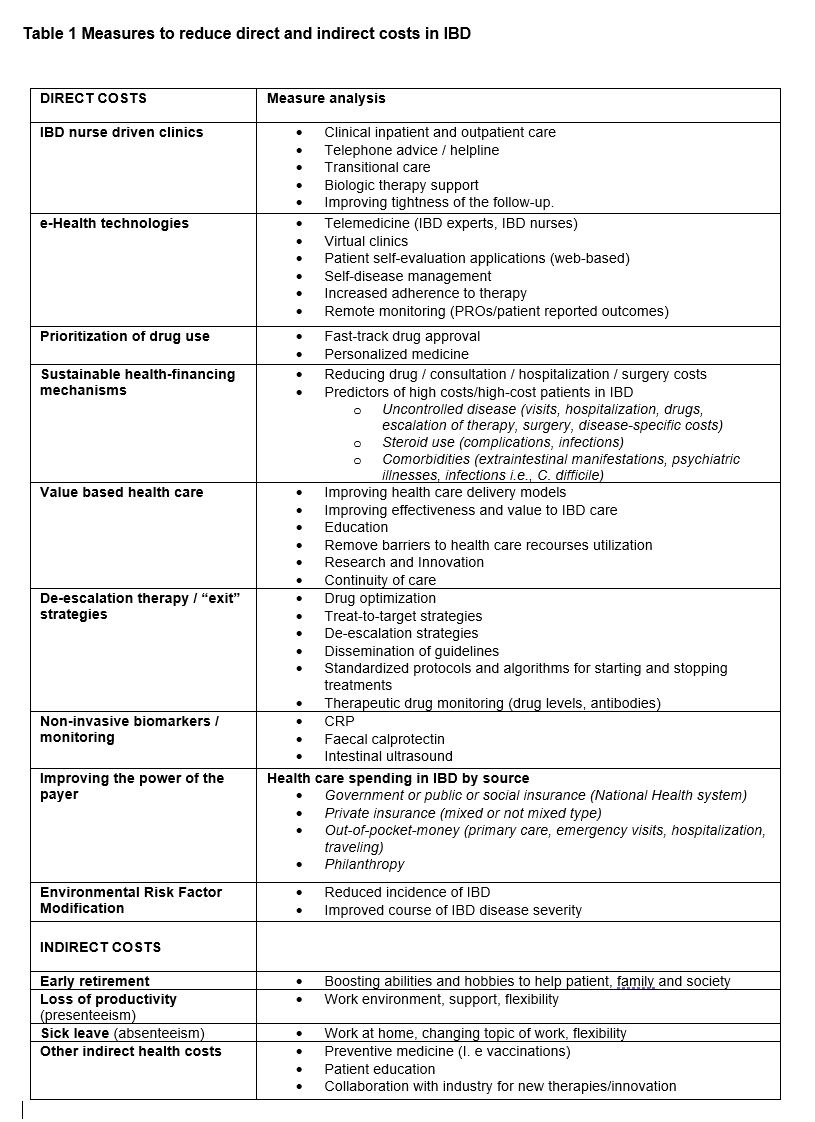P860 The Costs of Inflammatory Bowel Diseases in High-Income Settings
BurischPhD, J.(1)*;Zhao, M.(2);Odes, S.(3);De Cruz, P.(4);Vermeire , S.(5);Bernstein, C.N.(6);Kaplan, G.G.(7);Duricova, D.(8);Greenberg, D.(9);Melberg, H.O.(10);Watanabe, M.(11);Ahn, H.S.(12);Targownik, L.(13);Pittet, V.E.H.(14);Annese, V.(15);Park, K.(16);Konstantinos H. , K.H.(17);Høivik, M.L.(18);Krznaric, Z.(19);Chaparro, M.(20);Loftus, E.V.(21);Lakatos, P.L.(22);Gisbert, J.P.(23);Bemelman, W.(24);Moum, B.(18);Gearry, R.B.(25);Kappelman, M.D.(26);Hart, A.(27);Pierik, M.(28);Andrews, J.(29);Ng, S.(30);D'Inca, R.(31);Munkholm, P.(32);
(1)Hvidovre University Hospital, Department of Gastroenterology, Hvidovre, Denmark;(2)Hvidovre University Hospital, Gastrounit, Hvidovre, Denmark;(3)Ben-Gurion University of the Negev, Faculty of Health Sciences, Beer-Sheva, Israel;(4)Austin Health, Department of Gastroenterology, Melbourne, Australia;(5)University hospital Leuven, Department of Gastroenterology & Hepatology, Leuven, Belgium;(6)University of Manitoba, IBD Clinical and Research Centre, Manitoba, Canada;(7)University of Calgary, Department of Medicine and Community Health Sciences, Calgary, Canada;(8)ISCARE a.s., IBD clinical and Research Centre for IBD, Prague, Czech Republic;(9)Ben-Gurion University of the Negev, Guilford Glazer Faculty of Business and Management, Beer-Sheva, Israel;(10)UiT The Arctic University of Norway, Department of Community Medicine, Tromsø, Norway;(11)Tokyo Medical and Dental University, Advanced Research Institute, Tokyo, Japan;(12)College of Medicine- Korea University, Department of Preventive Medicine, Seoul, Korea- Republic Of;(13)Mount Sinai Hospital- University of Toronto, Division of Gastroenterology and Hepatology- Department of Medicine, Toronto, Canada;(14)University of Lausanne, Department epidemiology and health systems- Center for primary care and public health, Lausanne, Switzerland;(15)Fakeeh University Hospital, Division of Gastroenterology- Department of Internal Medicine, Dubai, United Arab Emirates;(16)Packard Health Alliance, Stanford Health Care, Alameda, United States;(17)Faculty of Medicine- University of Ioannina School of Health Sciences, Division of Gastroenterology- Department of Internal Medicine-, Ioannina, Greece;(18)Oslo University Hospital, Department of Gastroenterology, Oslo, Norway;(19)University Hospital Zagreb, Department of Gastroenterology- Hepatology and Nutrition, Zagreb, Croatia;(20)Universidad Autónoma de Madrid, Universitario de La Princesa- Instituto de Investigación Sanitaria Princesa IIS- Princesa, Madrid, Spain;(21)Mayo Clinic College of Medicine and Science, Division of Gastroenterology and Hepatology, Rochester, United States;(22)McGill University, Division of Gastroenterology, Montreal, Canada;(23)Universidad Autónoma de Madrid, Hospital Universitario de La Princesa- Instituto de Investigación Sanitaria Princesa IIS- Princesa, Madrid, Spain;(24)Amsterdam University Medical Centers, Department of Surgery, Amsterdam, The Netherlands;(25)University of Otago, Department of Medicine, Christchurch, New Zealand;(26)University of North Carolina at Chapel Hill, Division of Pediatric Gastroenterology- Department of Pediatrics and Center for Gastrointestinal Biology and Disease, Chapel Hill, United States;(27)St Mark’s Hospital, IBD Unit, Middlesex, United Kingdom;(28)Maastricht University Medical Centre, Department of Internal Medicine- Division of Gastroenterology and Hepatology, Maastricht, The Netherlands;(29)Royal Adelaide Hospital, IBD Service- Dept of Gastroenterology & Hepatology, Adelaide, Australia;(30)The Chinese University of Hong Kong, Department of Medicine and Therapeutics- Li Ka Shing Institute of Health Sciences- State Key Laboratory of Digestive Disease- Institute of Digestive Disease, Hong Kong, Hong Kong- China;(31)University of Padua, Department of Surgical- Oncological and Gastroenterological Sciences, Padua, Italy;(32)Copenhagen University Hospital – North Zealand, Department of gastroenterology, Hillerød, Denmark;
Background
Crohn’s disease (CD) and ulcerative colitis (UC), together known as inflammatory bowel diseases (IBD), affect approximately seven million people globally. The continuous rise in IBD prevalence and the aging of populations will inevitably lead to an increasing use of health care resources. In parallel with these trends, continuing innovations in IBD therapeutics, diagnostics, and preventatives are creating more options for IBD patients seeking to reduce their disease burden. These trends pose an imminent burden on health care systems and require that we identify modifiable cost drivers in IBD care and develop strategies for delivering equitable and affordable care for all patients.
Methods
This Lancet Gastroenterology & Hepatology Commission, consisting of a diverse faculty of health care professionals with expertise in the field of IBD and health economists, was formed to deliver an extensive summary of the literature and discuss key topics on the costs and cost-effectiveness of treating IBD in the present, and how this is likely to look in the future. Furthermore, it offers suggestions for how to deliver affordable IBD care in the coming years.
The report’s focus was on high-income countries in Europe, North America, Australia and New Zealand, and Asia.
Results
The Commission drew together a wide range of expertise to discuss the current costs of IBD care, the drivers of increasing costs, as well as how to deliver affordable care for IBD in the future. The key conclusions are that (i) increases in health care costs must be evaluated against improved disease control and reductions in indirect costs, and (ii) that overarching systems for data interoperability, registries, and big data approaches must be established for continuous assessment of effectiveness, costs, and cost-effectiveness of care. International collaborations should be sought in order to evaluate novel models of care (such as value-based health care, including integrated health care and participatory health care models), as well as to improve the education and training of clinicians, patients, and policymakers.
Measures to reduce the costs of IBD care are summarised in Table 1.
Conclusion
Increases in health care costs must be evaluated against improved disease control and reductions in indirect costs. Evaluations should be systematically aligned between countries and regions. Detailed analysis of the current epidemiology and the likely effects of changing IBD management on disease course and socioeconomic outcomes is essential; and will become even more imperative in the era of precision medicine, where complex biotechnologies will require expensive analyses, highly skilled personnel, and drug development for what may sometimes be relatively small patient groups.



